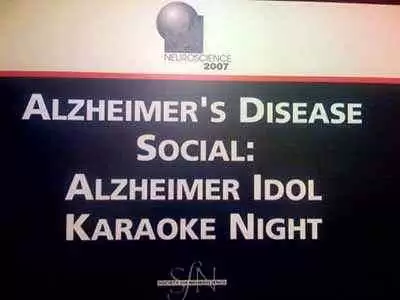
Celiac.com 04/26/2016 - Vice President Dan Quayle famously stated: "what a waste it is to lose one's mind, or not to have a mind is being very wasteful, how true that is," when speaking to people involved in the United Negro College Fund (1). While it is entertaining to read and ponder, this statement evokes some ideas I have about senility, which is increasing, along with many other modern diseases, at a frightening speed. The prospect of losing my mind, my memory, my sense of connection with friends and loved-ones, and even my sense of identity and personal hygiene is a frightening spectre. Can you separate your memories and experiences, along with what you think and feel, from who you are? I can't. I'm not sure I would want to be able to do so. My identity is tied to my memories, experiences, and how I responded and continue to respond to them. I remember looking at my son's tiny hands and feet when we first brought him home from the hospital. My daughter, born prematurely, had even smaller digits. They seemed impossibly tiny yet they were all perfectly formed and quite beautiful. It seemed miraculous to me. It still does. I can't imagine anything that I'd be willing to accept in exchange for those memories. Neither would I willingly surrender my memory of the joy I felt at my first convocation or my first car. Yet those lost memories form the prison in which many people already find themselves. It appears that many more will follow.
One segment of this problem, the epidemic of Alzheimer's disease (AD), already effects 5.4 million Americans and 30 million people throughout the world (2). Parkinson's disease, which is a neurological ailment that, in its later stages is often accompanied by dementia, is a similar ailment that is rapidly increasing both in absolute numbers and as a percentage of the population (3). Vascular dementia is yet another condition in which brain mass and mental acuity wane with advancing years (4). Perhaps this trend is partly due to the large number of aging baby boomers from the World War II era. But the relevant research suggests otherwise. Although we may be living longer and that may contribute to a small part of the growth of these devastating ailments, the biggest contributors appear to be lifestyle choices that include low daily activity levels, consumption of highly glycemic and inflammation-promoting refined carbohydrates and grain products, inadequate sleep duration, and exposure to toxic substances.
Celiac.com Sponsor (A12):
As most students of celiac disease have long been aware, there is a powerful and potentially devastating component of brain and neurological damage associated with this ailment as a result of gluten grain consumption. In addition to the behavioral changes identified by Gibbons in 1889 (5), attention deficits identified by Reichelt (6), Neiderhofer (7, 8), and others (9 - 11), subsequent reports have connected increased incidence of seizure disorders(12-17), reductions of brain size (17 -20), a variety of neurological movement disorders (21 -23), a range of mood disorders (24, 25), and several psychiatric ailments (26, 27) including schizophrenia (28, 29), and signs of learning disabilities have been reported to improve quite dramatically and quickly on a gluten-free diet (30). Sleep disorders are also common among people with celiac disease (31). With emerging research into non-celiac gluten sensitivity over the last two decades, we have also begun to see evidence of similar connections between gluten consumption and most of these neurological/brain ailments. This added dimension of non celiac gluten sensitivity and its impact on human neurological health, were previously obscure and, in the case of amyotrophic lateral sclerosis (ALS) (26, 32), was thought to be rapidly deadly and incurable (33). Most recently, Bredesen reported that the gluten-free diet, or a low grain diet, forms one significant part of their multi-modal protocol for reversing several dementias among a small group of those who experienced recent symptom onset, including Alzheimer's disease, objectively identified disruptions in memory function or subjective, self-reported symptoms of dementia (2). Of the ten subjects studied in this latter investigation, nine showed substantial recovery in the form of symptom reversal along with either a return to work or improved performance at work (2).
Harnessing the gluten-free diet makes sense, of course, because of the many neurological dimensions of gluten's harmful impact on human neurological tissues. Over the last 20 years, Dr. Marios Hadjivassiliou and colleagues, at the University of Sheffield and the Royal Hallamshire Hospital, have been reporting a wide range of neurological ailments in association with elevated anti-gliadin antibodies ( both with and without celiac disease) afflicting a large portion of their patients with neurological diseases of unknown origin (34 -37). Further, Dr. Joe Murray and colleagues have also reported on a group of thirteen patients experiencing moderate cognitive decline, three of whom experienced stabilized or improved cognitive function on a gluten-free diet alone (38). However, the protocol reported by Bredesen is aimed at correcting a greater number and broader spectrum of converging metabolic processes that are shaped, in large part, by our modern lifestyle, and are increasingly thought to be at the root of the current epidemic of dementias, including Alzheimer's disease (2). Gluten is only an important part of the overall picture. Dr. Suzanne de la Monte and colleagues have also identified a dynamic which they call type 3 diabetes at work in the brains of many patients with Alzheimer's disease (39). Insulin resistance, in the brain and elsewhere, is also a multi-factorial condition (40) which mostly involves disrupted metabolic processes, either through depletion of insulin production or, more likely, increased cellular resistance to insulin's movement of glucose into the cell.
Dr. Dale Bredesen has argued that "in the past decade alone, hundreds of clinical trials have been conducted for AD, at an aggregate cost of billions of dollars, without success. This has led some to question whether the approach taken to drug development for AD is an optimal one" (2) This is the rationale that underlies his enormously broad therapeutic approach employed in his protocol.
Please consider each of the following facets of Bredesen's therapeutic protocol:
1. Serum testing was conducted and subsequent supplement recommendations were made, aimed at improving vitamin, mineral, amino acid, and herb supplements to achieve optimal values. All of the foregoing is aimed at harnessing their putative anti-oxidant function, supporting various facets of metabolism, and making use of their reported anti-inflammatory properties. Chelation therapy was also used to correct heavy metal (mercury, lead, cadmium) toxicity. Non-farmed fish, vegetables, and fruits were emphasized, while meat consumption was either discouraged or patients were encouraged to eat only organic and free range meat.
2. Patients were given their choice of several low glycemic, low inflammatory, low grain diets. By this description, such a diet would exclude or severely limit gluten consumption.
3. Patients were encouraged to engage daily in strategies, including meditation and listening to music, toward reducing their stress levels, which would reduce their cortisol production. Cortisol is a hormone that triggers increased release of glucose into the bloodstream, suppresses the immune system, and inhibits bone formation. In addition to excluding or treating sleep apnea, patients were prescribed melatonin at 0.5 mg daily, toward achieving at least eight hours of sleep each night, thereby reducing production of hunger-inducing ghrelin hormones in the stomach and increasing hunger-suppressing leptin hormones which are produced in the fat cells. Each carries its message to the brain.
Reductions in cortisol and ghrelin secretion in combination with increasing leptin production would have a net effect of reducing inflammation while aiding weight loss and reducing blood glucose levels to normal fasting levels and targeting reduction of hemoglobin A1c levels to below 5.5, further reducing inflammation. Optimum levels of thyroid hormones, along with progesterone and pregnenolone were also pursued, along with reductions of free homocysteine to below 7 mg/L by prescription of vitamin B6, B12, and folic acid supplements, to reduce vascular damage and blockage that can be caused by elevated free homocysteine levels.
Twice daily dietary supplementation with medium chain triglycerides (MCTs) also provides strategy for altering hormone production aimed at improved cognitive function. In humans, medium chain fatty acids resist storage. They must either be converted to ketone bodies in the liver, or rapidly utilized for energy. Because MCTs can induce the liver to increase ketone production, it provides an alternative energy source for many of the brain's cells, without requiring insulin to usher these ketones into the cells, as glucose does. In essence, adequate ketone production provides an alternative fuel both for many brain and other cells throughout the body. The liver mostly produces the ketone called beta-hydroxybutyrate. This acts not only as a fuel source, but is also a powerful anti-oxidant that does not require insulin to enter the cell, unlike vitamin C, which does require insulin to enter cells.
4. To further promote these values and other facets of wellness arising out of regular activity, patients were asked to exercise for 30 to 60 minutes per day, 4 to 6 days each week.
Each and all of the above have been reported somewhere in the literature as valid and valuable as part of reversing dementias, which Bredesen's list of citations supports (2). However, while significant improvements in the dementia symptoms of nine of the ten subjects does argue for the validity of this protocol, wholesale acceptance of all of the concepts here would fail to narrow our focus on those factors that are most likely to contribute to causing the vast majority of the various dementias that are contributing to the emerging epidemic. Bredesen also acknowledges that study participants were encouraged to follow as many instructions as they could. They were not asked or expected to be fully compliant with the instructions they were given. Nonetheless, I would probably err on the side of caution, by implementing as many of these strategies as possible, were I dealing with a loved-one who struggled with dementia.
Conversely, I would be most reluctant to accept the interdiction of meats, organic or otherwise. On the other hand, growth promotion using low doses of anti-biotics can result in delivering anti-biotic resistant microbes. Poultry, hogs, and cattle are all high risk meats. Further, grains, especially gluten grains and corn, combine to form the mainstay of feeds used to fatten these animals and birds for market, where weight is the determining factor in the price paid for these meats.
Bredesen also pointed, quite rightly, to the small number of subjects as a weakness in his study. However, when 9 of their 10 subjects achieved such remarkable results, especially in the context of the common belief that dementia, at any stage, is irreversible, this study certainly suggests that exploring dementias as a group of metabolic illnesses is a potentially fruitful path.
This is a perspective that is enjoying considerable support from a variety of sources. Many researchers have, for the past decade or so, thought of many dementias as type 3 diabetes, with a growing body of support for this perspective amassing in the peer reviewed literature (41). More recently, chronic sleep deprivation has been similarly implicated in several ways. The first is specific to Alzheimer's disease, where beta amyloid deposits or plaques characterize this ailment. New research has shown that during sleep, brain tissues shrink, while the fluids that surround the brain permeate these tissues and inter-cellular structures, assimilating amyloid, which is a group of protein fragments (peptides) that are waste products of daytime brain cell activities (42). Because there is no lymphatic system in the brain, it has long been believed that the brain did not dispose of its waste products. However, another field of brain research has shown that conduits of these fluids form surrounding the blood vessels, carrying waste products into the bloodstream and, ultimately, out of the brain for disposal (42). Since average nightly sleep duration has shortened from nine hours to seven hours, given the above research findings, this reduction in sleep decreases our nightly capacity to remove waste amyloid and other detritus, leading to the formation and growth of amyloid deposits, which characterize at least one form of dementia.
This same culture-wide sleep deprivation also induces memory disturbances and memory losses. It does so by a circuitous route. Throughout the day, each of us encodes memories through our hippocampus, a small region of the brain that is also involved in spatial navigation and contributes, with other parts of the lymbic system, to the regulation of many body functions. During sleep, the day's memories are thought to be processed and integrated with prior knowledge, emotions, and impressions in the neo-cortex. Some researchers are now postulating that this integration process is what results in our dreams (43-45). Regardless of whether it is the author of our dreams, Dr. Robert Stickgold and colleagues have shown that sleep helps us to consolidate the day's learning experiences, thus improving our memory retention. He has also shown that inadequate sleep compromises learning (43). The net result is that we not only need sleep to permit the brain to clean out the day's wastes, we also need it to form and preserve learning.
Although Bredesen made no mention of it, there is another complicating factor here. Statin drugs are aimed at reducing cholesterol. However, they have also been shown to induce memory problems. One friend of mine was prescribed a statin drug, and he stopped being able to recognize me. After discontinuing this medication, he told me that I looked familiar, but he couldn't even guess at my name or where he knew me from. He waves hello to me from across the street, but doesn't cross it to visit anymore. And that seems to be where the recovery of his memory is stalled. It is with heart-rending sadness that I occasionally see him in passing. I say hello. But if he doesn't notice me waving or hear me shouting, there isn't even an exchange of greetings. He seems happy enough. So perhaps the loss is mostly mine. But I don't imagine that he would willingly have chosen this "new" world of his.
Sources:
1. Open Original Shared Link
2. Bredesen DE. Reversal of cognitive decline: a novel therapeutic program. Aging (Albany NY). 2014 Sep;6(9):707-17.
3. Moustafa AA, Chakravarthy S, Phillips JR, Crouse JJ, Gupta A, Frank MJ, Hall JM, Jahanshahi M. Interrelations between cognitive dysfunction and motor symptoms of Parkinson's disease: behavioral and neural studies. Rev Neurosci. 2016 Mar 16.
4. Dey AK, Stamenova V, Turner G, Black SE, Levine B. Pathoconnectomics of cognitive impairment in small vessel disease: A systematic review. Alzheimers Dement. 2016 Feb 25.
5. Gibbons, R. (1889). The Coeliac Affection in Children. Edinburgh Medical Journal. xxxv(iv), 321-330.
6. Ziegler, A., Nødland, M., Tveiten, D. and Reichelt, K.L. (2016) The AD/HD Syndrome as a Group of Biological Disorders. Open Journal of Pediatrics, 6, 22-28. Open Original Shared Link
7. Niederhofer H. Association of attention-deficit/hyperactivity disorder and celiac disease: a brief report. Prim Care Companion CNS Disord. 2011;13(3). pii
8. Niederhofer H, Pittschieler K. A preliminary investigation of ADHD symptoms in persons with celiac disease. J Atten Disord. 2006 Nov;10(2):200-4.
9. Zelnik N, Pacht A, Obeid R, Lerner A. Range of neurologic disorders in patients with celiac disease. Pediatrics. 2004 Jun;113(6):1672-6.
10. Welch E, Ghaderi A, Swenne I. A comparison of clinical characteristics between adolescent males and females with eating disorders. BMC Psychiatry. 2015 Mar 11;15:45.
11. Kozłowska ZE. [Evaluation of mental status of children with malabsorption syndrome after long-term treatment with gluten-free diet (preliminary report)]. Psychiatr Pol. 1991 Mar-Apr;25(2):130-4. Polish. (based on amateur translation)
12. Parisi P, Principessa L, Ferretti A, D'Onofrio D, Del Giudice E, Pacchiarotti C, Villa MP. "EEG abnormalities" may represent a confounding factor in celiac disease: A 4-year follow-up family report. Epilepsy Behav Case Rep. 2014 Mar15;2:40-2.
13. Korkmaz HA, Dizdarer C, Ecevit CO. Hypocalcemic seizure in an adolescent with Down syndrome: a manifestation of unrecognized celiac disease. Turk J Pediatr. 2013 Sep-Oct;55(5):536-8.
14. Devinsky O, Schein A, Najjar S. Epilepsy associated with systemic autoimmune disorders. Epilepsy Curr. 2013 Mar;13(2):62-8.
15. Vincent A, Crino PB. Systemic and neurologic autoimmune disorders associated with seizures or epilepsy. Epilepsia. 2011 May;52 Suppl 3:12-7.
16. Das G, Baglioni P. Coeliac disease: does it always present with gastrointestinal symptoms? QJM. 2010 Dec;103(12):999-1000.
17. Peltola M, Kaukinen K, Dastidar P, Haimila K, Partanen J, Haapala AM, Mäki M, Keränen T, Peltola J. Hippocampal sclerosis in refractory temporal lobe epilepsy is associated with gluten sensitivity. J Neurol Neurosurg Psychiatry. 2009 Jun;80(6):626-30.
18. Currie S, Hadjivassiliou M, Clark MJ, Sanders DS, Wilkinson ID, Griffiths PD, Hoggard N. Should we be 'nervous' about coeliac disease? Brain abnormalities in patients with coeliac disease referred for neurological opinion. J Neurol Neurosurg Psychiatry. 2012 Dec;83(12):1216-21.
19. Ryan AM, Ryan J, Wan-Ahmed M, Hardiman O, Farrell MA, McNamara B, Sweeney BJ. Vacuolar leucoencephalopathy and pulvinar sign in association with coeliac disease. BMJ Case Rep. 2009;2009. pii: bcr08.2008.0650.
20. Kieslich M, Errázuriz G, Posselt HG, Moeller-Hartmann W, Zanella F, Boehles H. Brain white-matter lesions in celiac disease: a prospective study of 75 diet-treated patients. Pediatrics. 2001 Aug;108(2):E21.
21. Caio G, De Giorgio R, Venturi A, Giancola F, Latorre R, Boschetti E, Serra M, Ruggeri E, Volta U. Clinical and immunological relevance of anti-neuronal antibodies in celiac disease with neurological manifestations. Gastroenterol Hepatol Bed Bench. 2015 Spring;8(2):146-52.
22. Finsterer J, Leutmezer F. Celiac disease with cerebral and peripheral nerve involvement mimicking multiple sclerosis. J Med Life. 2014 Sep 15;7(3):440-4. Epub 2014 Sep 25.
23. McKeon A, Lennon VA, Pittock SJ, Kryzer TJ, Murray J. The neurologic significance of celiac disease biomarkers. Neurology. 2014 Nov 11;83(20):1789-96.
24. Zingone F, Swift GL, Card TR, Sanders DS, Ludvigsson JF, Bai JC. Psychological morbidity of celiac disease: A review of the literature. United European Gastroenterol J. 2015 Apr;3(2):136-45.
25. Carta MG, Conti A, Lecca F, Sancassiani F, Cossu G, Carruxi R, Boccone A, Cadoni M, Pisanu A, Francesca Moro M, Demelia L. The Burden of Depressive and Bipolar Disorders in Celiac Disease. Clin Pract Epidemiol Ment Health. 2015 Dec 31;11:180-5.
26. Catassi C. Gluten Sensitivity. Ann Nutr Metab. 2015;67 Suppl 2:16-26.
27. Lionetti E, Leonardi S, Franzonello C, Mancardi M, Ruggieri M, Catassi C. Gluten Psychosis: Confirmation of a New Clinical Entity. Nutrients. 2015 Jul 8;7(7):5532-9
28. Porcelli B, Verdino V, Bossini L, Terzuoli L, Fagiolini A. Celiac and non-celiac gluten sensitivity: a review on the association with schizophrenia and mood disorders. Auto Immun Highlights. 2014 Oct 16;5(2):55-61.
29. De Santis A, Addolorato G, Romito A, Caputo S, Giordano A, Gambassi G, Taranto C, Manna R, Gasbarrini G. Schizophrenic symptoms and SPECT abnormalities in a coeliac patient: regression after a gluten-free diet. J Intern Med. 1997 Nov;242(5):421-3.
30. Blair A. Wheat-free diet gives food for thought. The Times (UK) June 12, 2004 Open Original Shared Link
31. Zingone F, Siniscalchi M, Capone P, Tortora R, Andreozzi P, Capone E, Ciacci C. The quality of sleep in patients with coeliac disease. Aliment Pharmacol Ther. 2010 Oct;32(8):1031-6.
32. Brown KJ, Jewells V, Herfarth H, Castillo M. White matter lesions suggestive of amyotrophic lateral sclerosis attributed to celiac disease. AJNR Am J Neuroradiol. 2010 May;31(5):880-1.
33. Hoggan R.
34. Hadjivassiliou M, Gibson A, Davies-Jones GA, Lobo AJ, Stephenson TJ, Milford-Ward A. Does cryptic gluten sensitivity play a part in neurological illness? Lancet. 1996 Feb 10;347(8998):369-71.
35. Hadjivassiliou M, Rao DG, Grìnewald RA, Aeschlimann DP, Sarrigiannis PG, Hoggard N, Aeschlimann P, Mooney PD, Sanders DS. Neurological Dysfunction in Coeliac Disease and Non-Coeliac Gluten Sensitivity. Am J Gastroenterol. 2016 Feb 2.
36. Hadjivassiliou M, Duker AP, Sanders DS. Gluten-related neurologic dysfunction. Handb Clin Neurol. 2014;120:607-19.
37. Hadjivassiliou M, Rao DG, Wharton SB, Sanders DS, Grünewald RA, Davies-Jones AG. Sensory ganglionopathy due to gluten sensitivity. Neurology. 2010 Sep 14;75(11):1003-8.
38. Hu WT, Murray JA, Greenaway MC, Parisi JE, Josephs KA. Cognitive impairment and celiac disease. Arch Neurol. 2006 Oct;63(10):1440-6.
39. de la Monte SM. Brain insulin resistance and deficiency as therapeutic targets in Alzheimer's disease. Curr Alzheimer Res. 2012 Jan;9(1):35-66
40. de la Monte SM, Tong M. Brain metabolic dysfunction at the core of Alzheimer's disease. Biochem Pharmacol. 2014 Apr 15;88(4):548-59.
41. de la Monte SM. Type 3 diabetes is sporadic Alzheimer's disease: mini-review. Eur Neuropsychopharmacol. 2014 Dec;24(12):1954-60.
42. Nedergaard M, Goldman SA. Brain Drain. Scientific American. 2016 March; p. 44-49.
43. Stickgold R. Parsing the role of sleep in memory processing. Curr Opin Neurobiol. 2013 Oct;23(5):847-53.
44. Stickgold R. Early to bed: how sleep benefits children's memory. Trends Cogn Sci. 2013 Jun;17(6):261-2
45. Stickgold R, Walker MP. Sleep-dependent memory triage: evolving generalization through selective processing. Nat Neurosci. 2013 Feb;16(2):139-45.
46. Taheri S, Lin L, Austin D, Young T, Mignot E (2004) Short sleep duration is associated with reduced leptin, elevated ghrelin, and increased body mass index. PLoS Med 1(3): e62. Sleep deprivation raises ghrelin & lowers leptin production.









Recommended Comments
Create an account or sign in to comment
You need to be a member in order to leave a comment
Create an account
Sign up for a new account in our community. It's easy!
Register a new accountSign in
Already have an account? Sign in here.
Sign In Now